- Home
- Cornelia Funke
The Petrified Flesh Page 2
The Petrified Flesh Read online
Page 2
GOYL
The barren field still reeked of blood, the scent of all battlefields. Hentzau’s horse was used to it, as were his soldiers. The rain had filled the trenches with a muddy sludge and behind the walls both sides had built, the ground was covered with rifles and bullet-riddled helmets. Kami’en had ordered the horse cadavers and human corpses to be burned before the air filled with the stench of their decay. His own dead soldiers though—the King had left them where they had fallen, as was Goyl custom. In just a few days, they would be all but indistinguishable from the rocks protruding from the trampled earth, and the heads of those who had fought valiantly had already been sent to the Royal Fortress to line the underground Avenue of the Dead.
Another battle. Hentzau was tired of them, but he hoped that this would be the last one for a while. The Empress was finally ready to negotiate, and even Kami’en wanted peace. Hentzau covered his mouth as the wind blew the ash from their fallen enemies down from the hill. Six years aboveground, six years without the protecting shield of the earth between him and the sun. His eyes ached from all the light, and the air made his skin as brittle as chalk. Hentzau’s skin resembled brown jasper—not the finest color for a Goyl. Hentzau was the first Jasper Goyl to have risen to the highest military ranks. But then before Kami’en the Goyl had never had a king, and Hentzau liked his skin. Jasper provided far better camouflage than onyx or moonstone.
Kami’en had set up camp not far from the battlefield in the hunting lodge of one of the Empress’s generals who, along with most of his officers, had died in the battle.
Two Goyl sentries were guarding the gate. They saluted as Hentzau rode past. The King’s bloodhound, that’s what they called him. His jasper shadow. Hentzau had served under Kami’en since they had first challenged the other chiefs. It had taken two years for them to kill them all, and for the Goyl to crown their first king.
The drive leading up to the lodge was lined with statues. It always amused Hentzau that humans immortalized their gods and heroes with stone effigies while they loathed his kind. Even the Doughskins had to admit it: in this world only stone could claim to last.
They had bricked up the windows of the lodge, as they did all buildings they occupied, but Hentzau didn’t feel at ease until he descended the steps to the cellars and finally felt the soothing darkness one could only find below ground. The vaults, once stacked with supplies and dusty trophies, housed Kami’en’s general staff and no Goyl needed lamps or candles to see in the dark.
Kami’en. In their language, it meant nothing more than “stone.” His father had governed one of the lower cities, but fathers did not count among the Goyl. It was the mothers who raised them, and by the age of nine, Goyl were considered grown-up and had to fend for themselves. At that age, most of them went to explore the Lower World, with its crystal caves, black lakes, and petrified forests, proving their courage by advancing deeper and deeper to the Lost Palaces with their mirrors and silver columns, until the heat became unbearable even for Goyl skin. Kami’en, however, had never been interested in exploring the deep. All he cared about was the world above. He had lived for a while in one of the cave cities they had built aboveground when the copper plague raged in their lower cities. When a human attack killed one of his sisters, he had begun to study their weapons and strategies. At nineteen he had conquered one of their cities. The first of many.
When the guards waved Hentzau into headquarters, Kami’en was standing at the table where each morning the positions of his enemies were staged. He had ordered the figurines after he had won his first battle: soldiers, snipers, gunners, cavalry… The Goyl were carved from carnelian, the Empress’s troops marched in ivory, Lotharaine wore gold, Albion was cast in copper. Kami’en eyed the figurines as if he were searching for a way to beat them all at once. He was wearing black, as always when he was out of uniform. It made his pale red skin look like petrified fire. Never before had carnelian been the color of a Goyl leader. For centuries onyx had been the color of their nobility.
Kami’en’s mistress was wearing green as usual, layers of emerald velvet enveloping her like the petals of a flower. The most beautiful Goyl women paled next to her, like pebbles next to polished moonstone, but Hentzau had ordered his soldiers not to look at her. The old jasper Goyl was long past the age where he’d believed in fairy tales, but he believed all the stories about Fairies and the lovelorn idiots they turned with a glance into thistles or helplessly wriggling fish. Their beauty was more lethal than spiders’ venom. The water had given birth to them all. Hentzau feared them as much as he feared the oceans that gnawed at the rocks of his world. He hated them especially for that fear.
The Dark Fairy smiled as if she had read his mind. Many believed she could but Hentzau didn’t, or she would have killed him long ago for what he thought about her. She was the most powerful of them all—maybe that was the reason her own sisters had cast her out.
He turned his back on her and bowed his head to his King.
“I was told you need me to find someone.”
Kami’en took an ebony figurine and set it aside. Each one represented a hundred soldiers.
“Yes. A human growing the Petrified Flesh.”
Hentzau cast a quick glance at the Fairy.
“And how am I supposed to do that? There are thousands of them by now!”
Man-Goyl. Nobody fought humans with less mercy, but Hentzau despised them just as much as he despised the Fairy who had created them. The Goyl had always used their claws to kill, but now her spell had turned them into tools of sorcery. Like all Fairies, the Dark One couldn’t bear children, so she gave Kami’en sons by sowing stone into his enemies’ flesh with every strike of his soldiers’ claws.
“Don’t worry. It won’t be difficult to find this one.” Kami’en removed another two ebony figurines from the map. “He is growing a skin of jade.”
The guards exchanged a quick look but Hentzau frowned with mocking disbelief. Lava-Men who boil the blood of the earth, the eyeless bird that sees everything under and above the ground—and the Goyl with the jade skin who’ll grant invincibility to the King he serves… stories told to children to paint images into the darkness underground.
“I’ll have the scout executed who told you that.” Hentzau rubbed his aching skin. The damn cold would soon make him look like a cracked jar. “The jade Goyl is a fairy tale! Since when do you confuse those with reality?”
The guards nervously ducked their heads. Any other Goyl would have paid for that remark with his life, but Hentzau knew that Kami’en loved him for his honesty. And for the fact that he still wasn’t afraid of him.
“You have your orders!” he said, as casually as if he hadn’t noticed Hentzau’s mockery. “Find him. She saw him in her dreams.”
Ah, there was the source.
The Fairy smoothed the velvet of her dress. Six fingers on each hand, one for each curse. Hentzau felt the rage rise in him that they all bore in their stone flesh. He would die for his King if necessary, but to search for his mistress’s daydreams was an entirely different matter.
“The King of the Goyl doesn’t need a jade Goyl to be invincible!”
King. Still an unfamiliar word for Goyl tongues. But by now even Hentzau hesitated to address Kami’en only by his name. And yes, he held his jasper dog in high esteem for not being as docile as most of his officers, but to disrespect his mistress was something he didn’t forgive lightly.
“Find him!” he repeated, eyeing Hentzau like a stranger. “She says it is important, and so far she’s always been right.”
The Fairy moved to Kami’en’s side. Hentzau pictured himself breaking her pale neck but not even that gave him comfort. She was immortal, and one day she would watch him die. Him and the King. And Kami’en’s children and his children’s children. They all were nothing but her mortal toys. But Kami’en loved her. More than his two Goyl wives, who had given him three daughters and two sons.
Because she had hexed him!
“I saw him in the Hu
ngry Forest.” Even her voice sounded like water.
“That forest covers more than sixty square miles!”
She again smiled. She probably imagined him as a fish twisting breathlessly at her feet. Hentzau almost choked on his hatred.
“That sounds as if you should ask for some help.” She clearly enjoyed his alarm when she raised her hand to open the pearl clasps holding her hair. It reached her hips when it fell down. Most people compared it to finely spun copper or red gold but for Hentzau its color resembled dried blood. Black moths fluttered out from under her fingers when she drove her hand through it. The pale spots on their wings were shaped like skulls.
The guards quickly opened the doors as they swarmed toward them. Hentzau’s soldiers, who had been waiting outside, recoiled with equal haste. It was well-known that Fairy moths even penetrated Goyl skin with their sting—and that their victims rarely survived.
“Once they find the jade Goyl—” their mistress said, pushing the clasps back into her hair, “—they will let you know. And you’ll bring him to me.”
His men were staring at her through the open door.
Fairy.
Damn her and the night she had appeared among their tents. The third battle, and their third victory. She had appeared between the tents as if the groans of their wounded had summoned her. Hentzau had stepped into her path but she had just walked through him, like liquid through porous stone, and then she had stolen Kami’en’s heart to fill her own heartless bosom with it. True. Their best weapons combined did not spread half as much terror amongst their enemies as her curse. Yet he was certain that they would have still won the war without her and that victory would have tasted so much sweeter.
Kami’en was watching him. No, the Fairy couldn’t read his thoughts but his King did it with ease.
“I will find the Man-Goyl,” he said, pressing his fist against his heart, their oldest gesture of respect. “If he really is more than just a dream.”
He still felt the Fairy’s gaze when he stepped out into the daylight that clouded his eyes and cracked his skin.
He couldn’t remember ever to have hated like this.
4
CLARA
Will’s voice had sounded so different Clara had barely recognized it. No call or message for weeks, and then this stranger on the phone who wouldn’t really say why he was calling. Fear. That’s what Clara had heard in his voice. Worse than the fear she knew from the hospital corridors, where she tried daily to learn how to face sickness and death.
She had to see him. That was all she knew. Find out what had happened and why he had disappeared for weeks.
The streets were even more congested than usual, and it seemed to take a lifetime to reach the old apartment building where Will had grown up. Chiseled faces stared down from the gray façade, their contorted features eroded by exhaust fumes. Their eyes were gilded, Clara noticed it for the first time. The doorman in the hall was as bad tempered as usual, Tomkins, yes, that was his name. He reminded Clara of a cat in his uniform, a fat gray tomcat, who licked his lips each time he saw her.
“Nobody at home up there, Miss,” he said, as he openly scrutinized her from head to toe.
Clara realized she was still wearing the pale green hospital gown under her coat. She had been in such a hurry she hadn’t taken time to change. He had sounded so lost. Like someone who was drowning.
The grill doors of the elevator were stuck, as usual. Will called it the Hänsel-cage. Tomkins didn’t come to her aid and Clara was relieved when the elevator finally moved. “Don’t take him seriously,” Will had advised when she had complained about the doorman’s rudeness. “He knows me and Jacob since we were born and treats everyone this way. Sometimes he even tells people we’re not at home, because he doesn’t like them.” And then he had kissed her.
Will.
The old elevator took so long that Clara always felt she had reached the top of the world when she got out on the seventh floor. She tried the bell first, but there was no answer. The copper nameplate next to the door was so tarnished that she was always tempted to wipe it with her sleeve. RECKLESS. Will often made fun of how that name did not suit him at all. When Clara finally used the key he had given her, she stumbled into a pile of unopened mail behind the door. Had Will called her from somewhere else?
She walked into the kitchen. A dirty coffee mug on the table. A book he had been reading.
“Will?” His mother’s room was unchanged, although she had died four months ago. Clara hesitated before she opened the door of his brother’s room. Jacob. She still hadn’t met him. “Jacob is traveling.” Jacob was always traveling. Sometimes she wasn’t sure whether he actually existed.
Will’s room was to the right. It was empty too. Just the usual mess. His clothes on the floor. A bowl of half-eaten cereal. Judging from the mold it had been sitting there for weeks.
Where was he?
She only noticed the open door to his father’s study when she stepped back into the corridor. Will never entered that room. He ignored anything that had to do with his father. “He’s gone. Left us without a word and broke my mother’s heart,” that was all he ever told her about him.
Clara walked through the open door.
A desk, bookshelves, a glass cabinet filled with old-fashioned pistols. Above the desk a few model planes were gathering dust on their wings like dirty snow.
Between the bookshelves a huge mirror leaned against the wall. The silver frame was covered with roses. Their metal thorns almost pricked Clara’s finger when she touched one. Each was shaped so perfectly that their scent seemed to linger in the dusty air. The glass they framed was as dark as if it had caught the night. It was so clear that Clara wondered who had polished it, but right where she saw the reflection of her face was the imprint of a hand.
5
SCHWANSTEIN
The light of the lanterns filled Schwanstein’s streets like spilled milk. Gaslight, wooden wheels bumping over cobblestones, women in long skirts with their hems soaked from the rain. Jacob couldn’t remember when he had begun to perceive all this as normal and the world he came from as a sometimes more bewildering reality. At fourteen? Sixteen? No, probably much sooner. His mother’s father had always talked in German to him, which had helped him at least to understand some bits of Austrish from the beginning. The first years it hadn’t been easy to keep himself from starving or ending up in a workhouse. Jacob owed it to two people that neither had happened to him. One of them was a Witch, a white one. Alma Spitzweg practiced as a healer in a village on the other side of the castle hill and had saved him many times, but this time even her magic wouldn’t help. As for the other one—well, if anyone in this world knew of a way to save his brother, it would be Albert Chanute.
The church bells were ringing for the evening service as Jacob walked down the street that led to Schwanstein’s market square. A Dwarf woman was selling roasted chestnuts in front of a bakery. Their sweet aroma mixed with the smell of the horse manure scattered all over the cobblestones. The idea of the combustion engine had not yet made it through the mirror. The monument at the center of the square showed Karolus, the Goyl Burner, an ancestor of Therese of Austry, the reigning Empress, who had not only made necklaces for his mistress from Moonstone Goyl skin, but had also been a tireless hunter of Giants in the surrounding hills. It was one of Jacob’s greatest regrets that both Giants and Dragons were now extinct behind the mirror. He had to admit that he wouldn’t have missed the Stilt who almost had torn out his throat during his first visit. But what about Grass-Elves, Heinzel, Thumblings, Nymphs, or Witches? Would they be next to disappear? Schwanstein had changed since Jacob had come through the mirror for the first time. The damp autumn air smelled of smoke, and soot blackened the laundry that hung between the pointy gables. There was a railroad station right opposite the old coach station, a telegraph office, and a photographer who fixed stiff hats and ruffled skirts onto silver plates. Bicycles leaned against walls on which posters warne
d of Gold-Ravens and Watermen. Sometimes Jacob wondered whether Schwanstein embraced the modern times even more eagerly than the rest of Mirrorworld and how much of that could be blamed on the mirror in his father’s study.
Grass-Elves, Heinzel, Thumblings, Nymphs, or Witches… what about the Goyl, Jacob? Every human citizen of Mirrorworld would have celebrated their extinction.
The paperboy standing next to the Goyl Burner’s monument, shouting the latest news into the gathering dusk, had certainly never seen more than the footprint of a Giant or the faded scorch marks of Dragon fire on the town walls. But the Goyl were as much a part of his reality as the Dwarf woman selling roasted chestnuts or the Heinzels assisting the bakers to roll out the batter.
Decisive battle, terrible losses… secret negotiations with the Goyl…
The Mirrorworld was at war, and it was not being won by humans. Four days had passed since he and Will had run into one of their patrols, but Jacob could still see them come out of the forest: three soldiers and an officer, their stone faces wet from the rain. Golden eyes, black claws tearing open his brother’s neck—Goyl.
“Look after Will, Jacob. He is so different from you.”
He put three copper coins into the paperboy’s grubby hand. The Heinzel sitting on his shoulder eyed them both suspiciously, and while many Heinzels chose human companions who fed and clothed them, that did little to improve their crabby dispositions.
“How far away are the Goyl?” Jacob took a newspaper.
“Less than five miles from here, sir.” The boy pointed southeast. “With the wind right, we could hear their cannons. But it’s been quiet since yesterday.”
He sounded almost disappointed. At his age, even war sounded like an adventure. The imperial soldiers filing out of Albert Chanute’s tavern knew better. THE OGRE. Jacob had met the Man Eater who had given the tavern its name and had cost its owner his right arm.

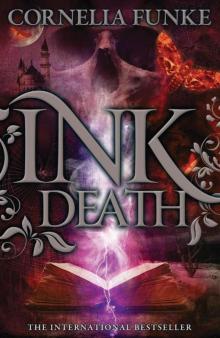 Inkdeath
Inkdeath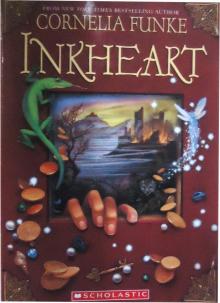 Inkheart
Inkheart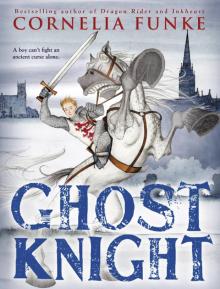 Ghost Knight
Ghost Knight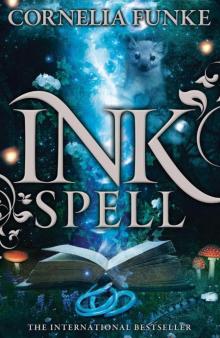 Inkspell
Inkspell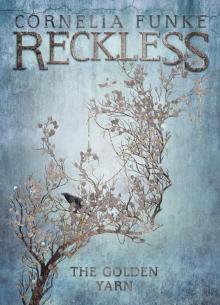 The Golden Yarn
The Golden Yarn Fearless
Fearless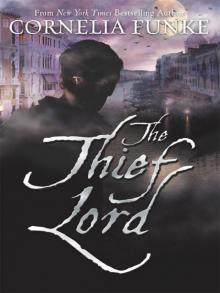 The Thief Lord
The Thief Lord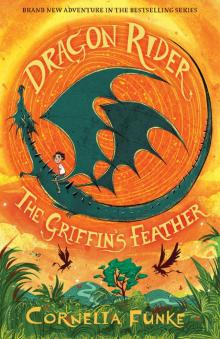 The Griffin's Feather
The Griffin's Feather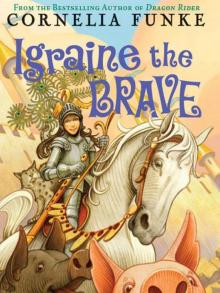 Igraine the Brave
Igraine the Brave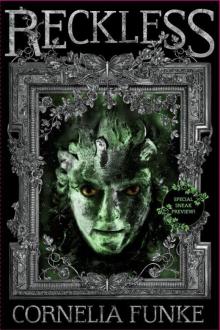 Reckless
Reckless When Santa Fell to Earth
When Santa Fell to Earth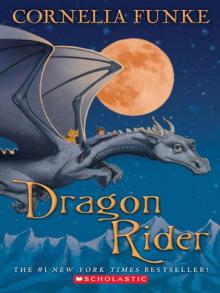 Dragon Rider
Dragon Rider Living Shadows
Living Shadows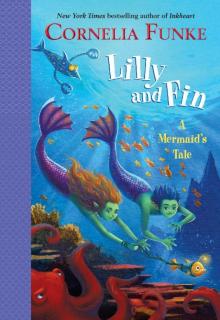 Lilly and Fin: A Mermaid's Tale
Lilly and Fin: A Mermaid's Tale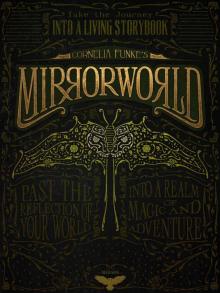 The MirrorWorld Anthology
The MirrorWorld Anthology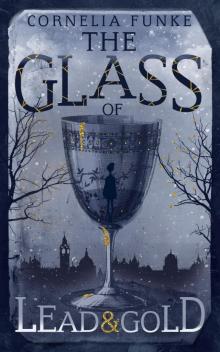 The Glass of Lead and Gold
The Glass of Lead and Gold Ghosthunters and the Incredibly Revolting Ghost
Ghosthunters and the Incredibly Revolting Ghost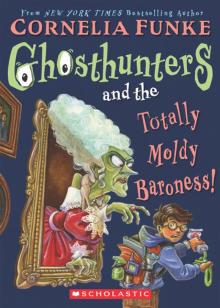 Ghosthunters and the Totally Moldy Baroness!
Ghosthunters and the Totally Moldy Baroness! Reckless II
Reckless II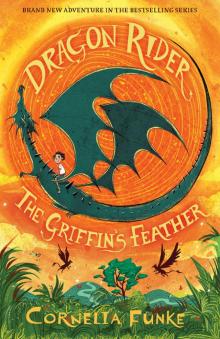 Griffin's Feather
Griffin's Feather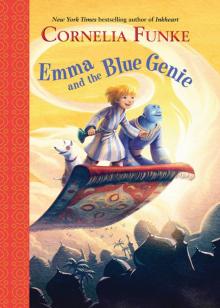 Emma and the Blue Genie
Emma and the Blue Genie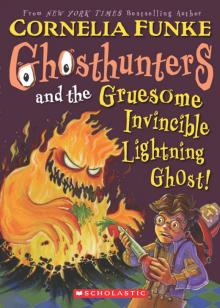 Ghosthunters and the Gruesome Invincible Lightning Ghost
Ghosthunters and the Gruesome Invincible Lightning Ghost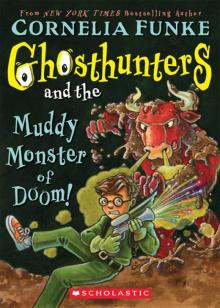 Ghosthunters and the Muddy Monster of Doom!
Ghosthunters and the Muddy Monster of Doom! Inkheart ti-1
Inkheart ti-1 The Pirate Pig
The Pirate Pig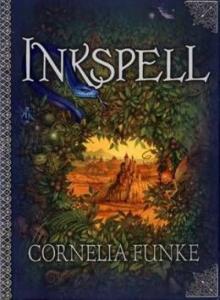 Inkspell ti-2
Inkspell ti-2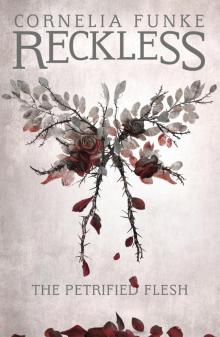 The Petrified Flesh
The Petrified Flesh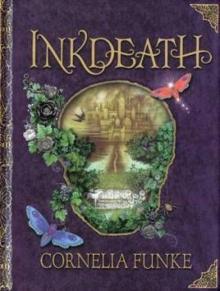 Inkdeath ti-3
Inkdeath ti-3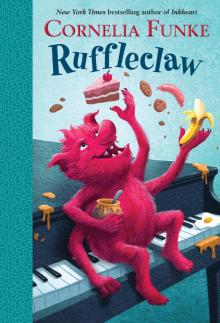 Ruffleclaw
Ruffleclaw Lilly and Fin
Lilly and Fin